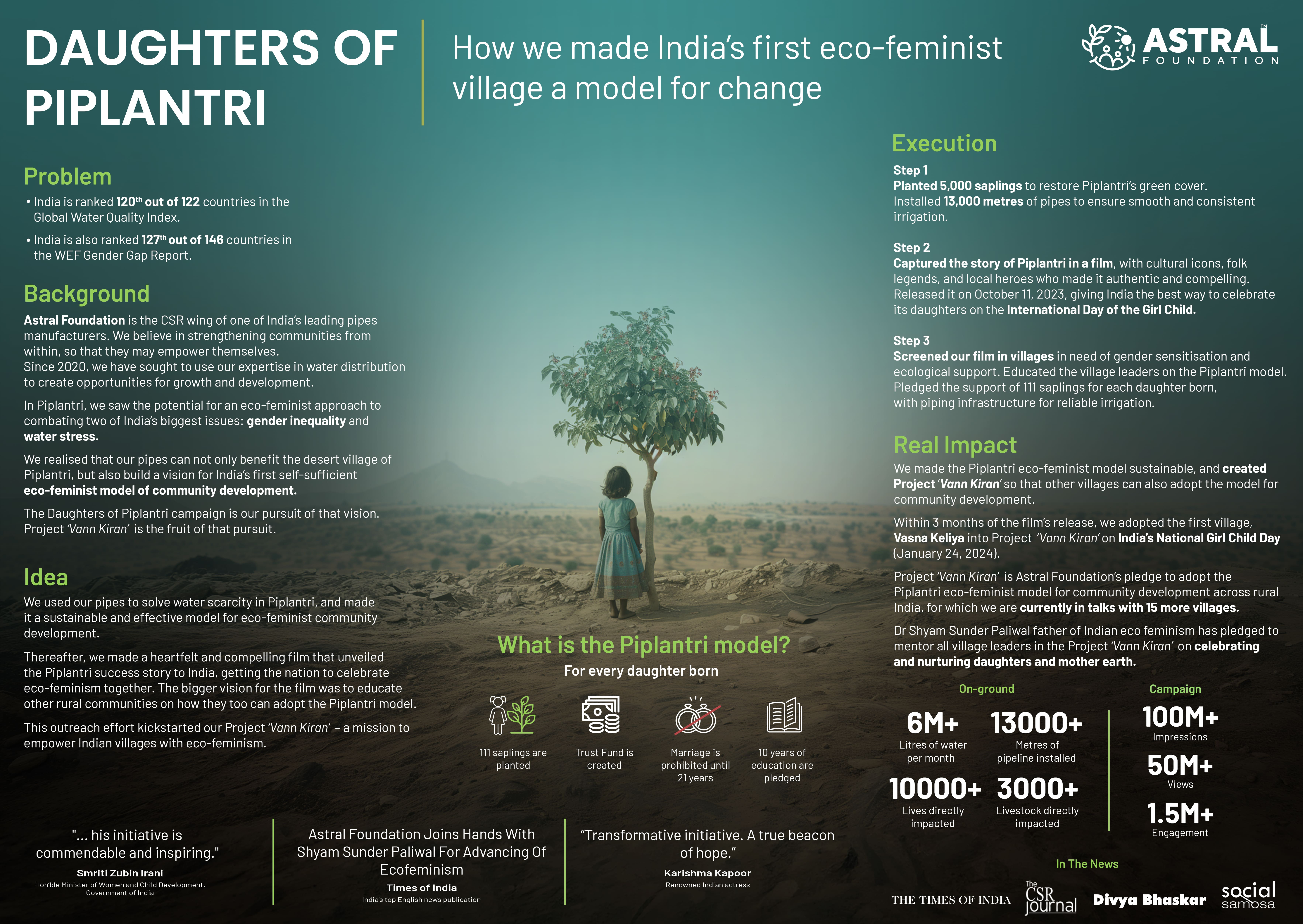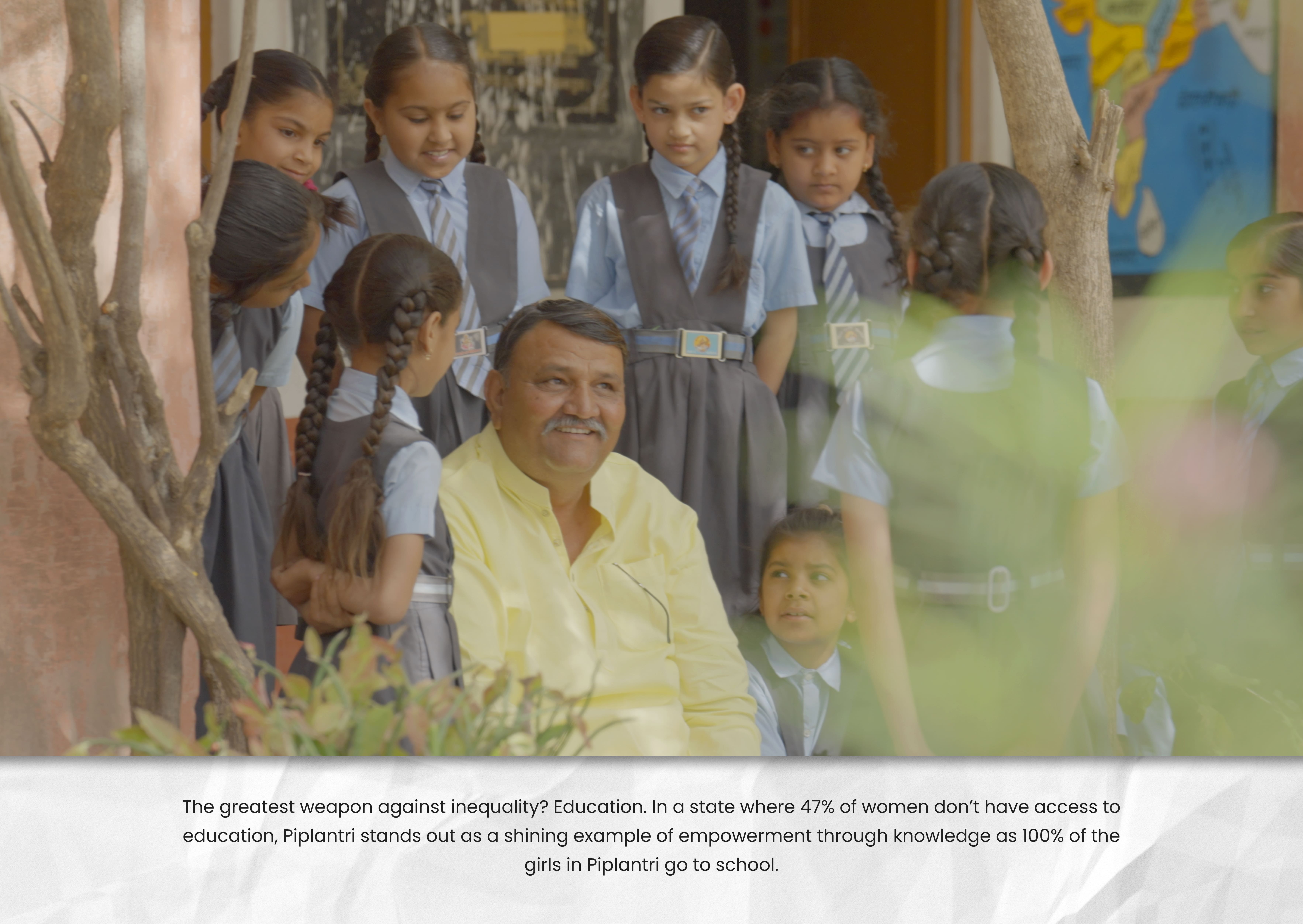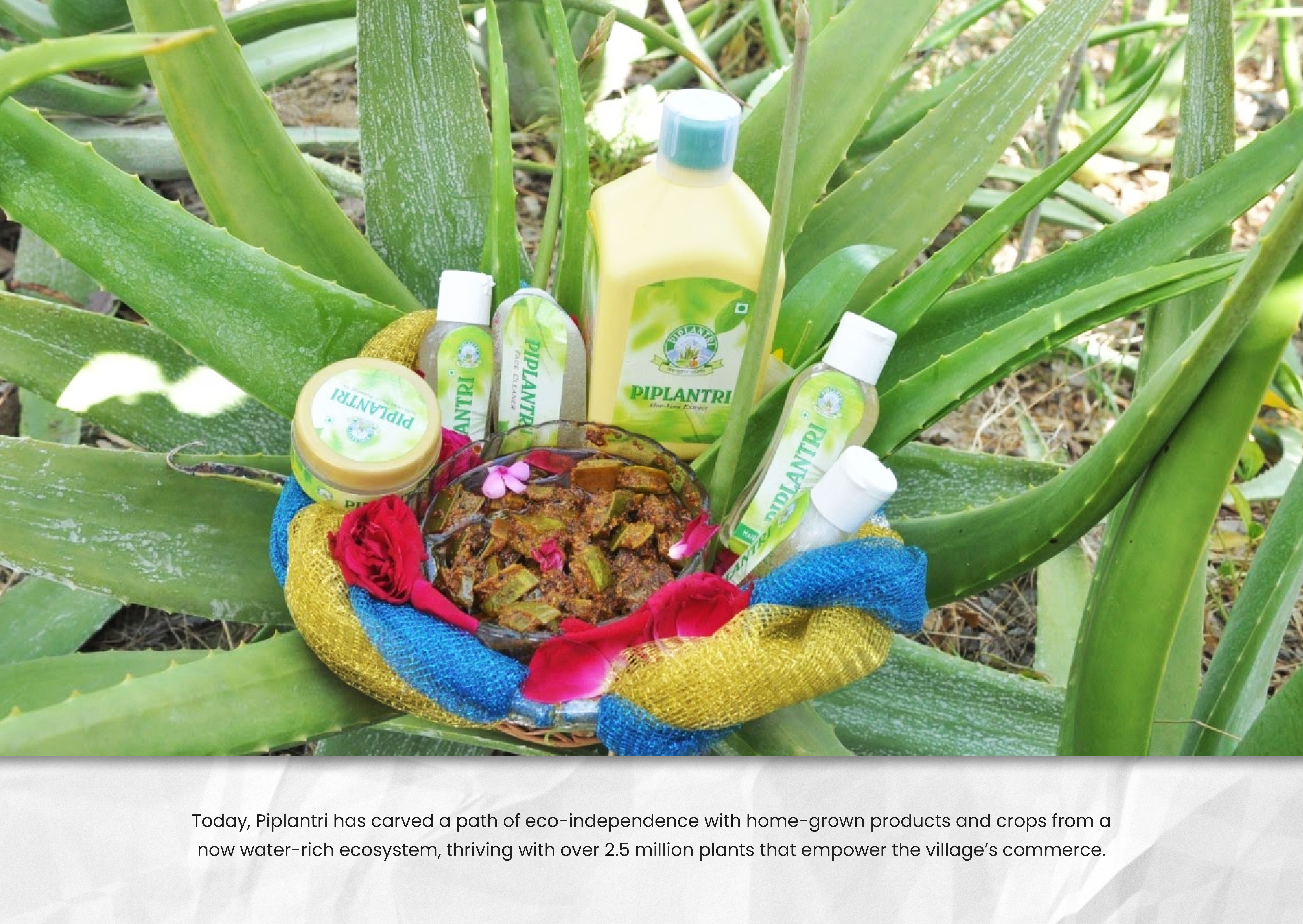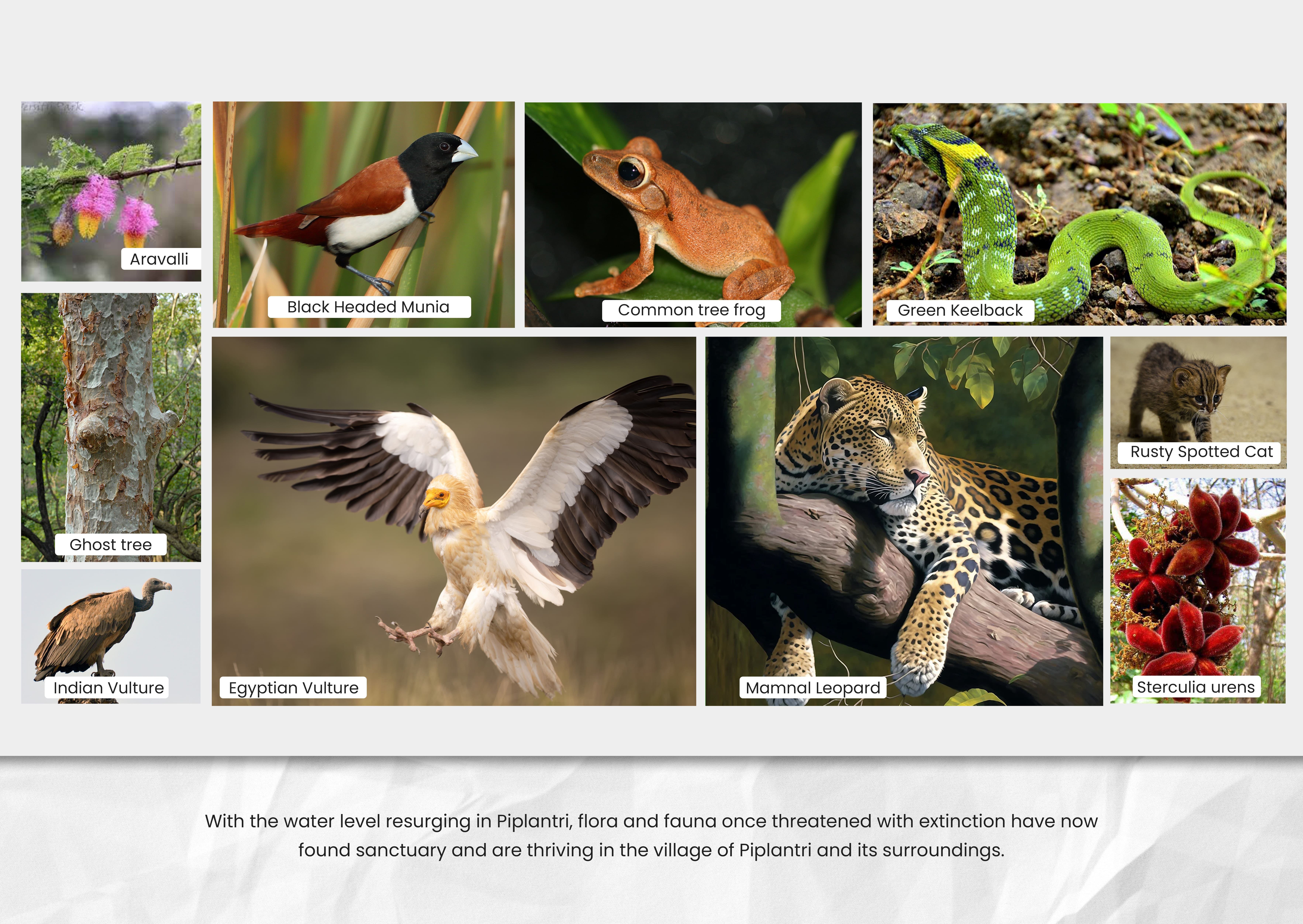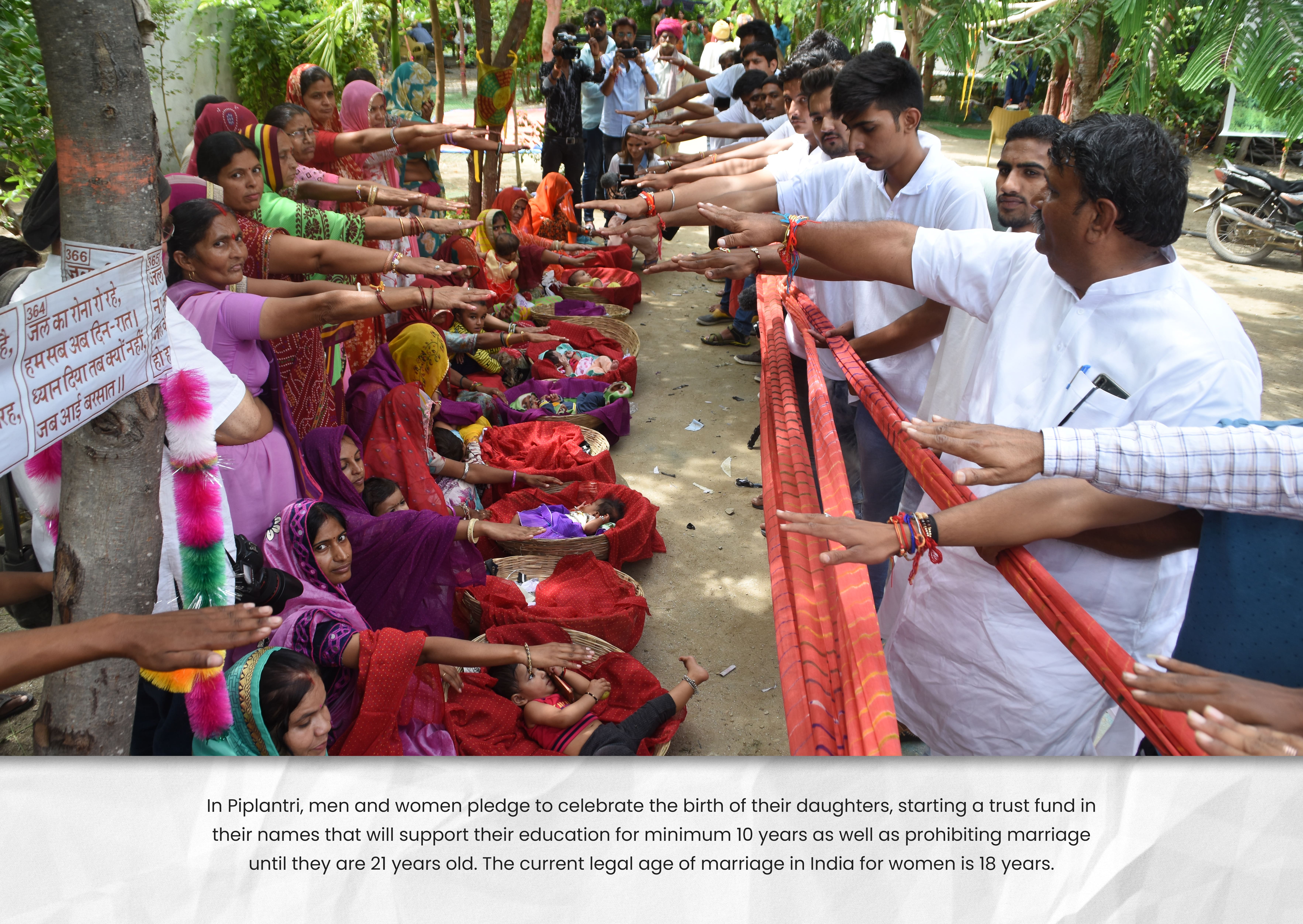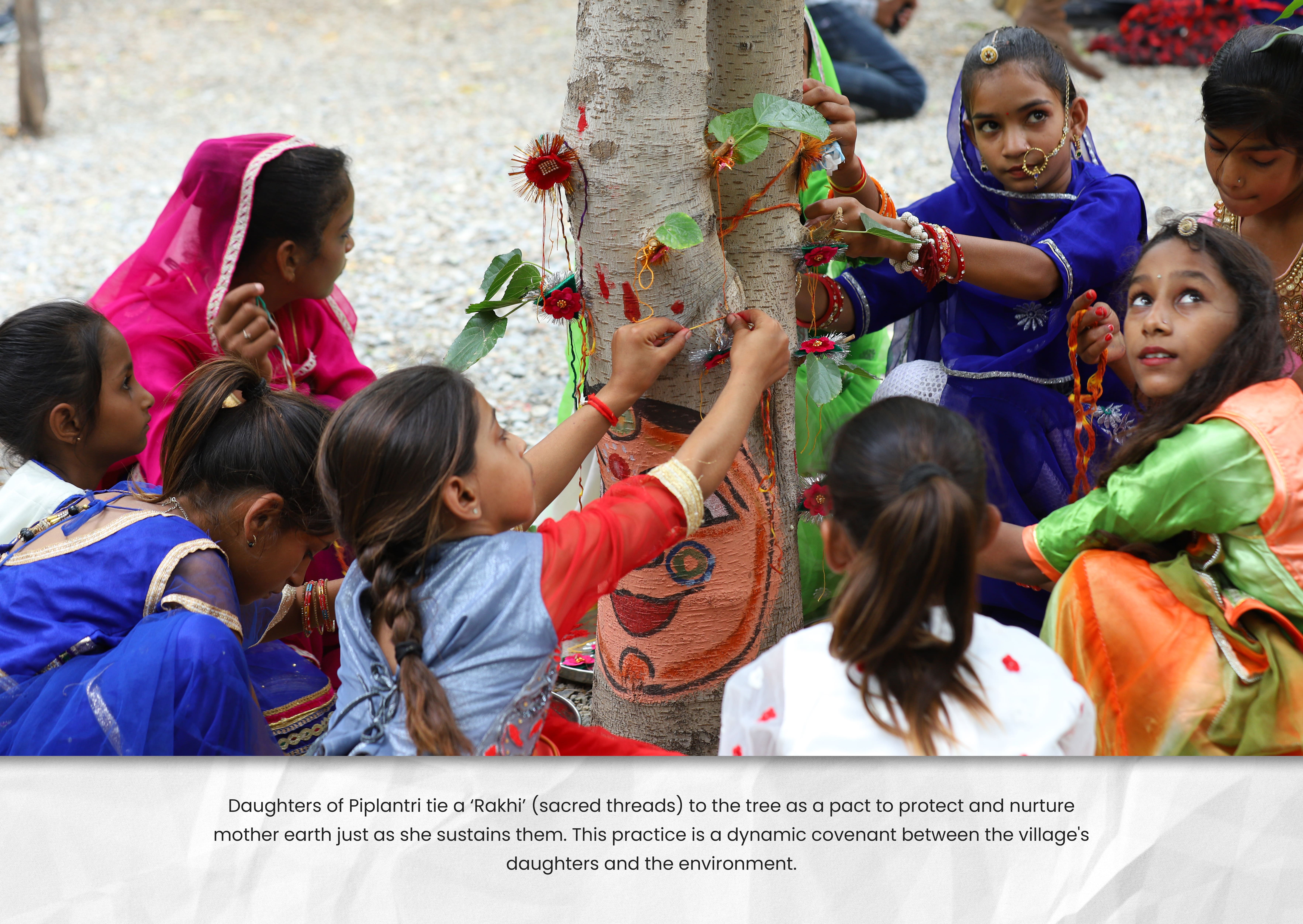
2024
Daughters of Piplantri
Entrant Company
White Rivers Media
Category
Social Media (Campaign) - Diversity, Equity & Inclusion
Client's Name
Astral Foundation
Country / Region
India
PROBLEM:
India is ranked 127th out of 146 countries in the 2023 World Economic Forum Gender Gap Report.
India is ranked 120th out of 122 countries in the Global Water Quality Index.
A study conducted in 2020 estimates that due to sex-selective abortions, India will see 6.8 million fewer female births than there would have been otherwise.
In the state of Rajasthan (India), due to a lack of education and awareness, especially in impoverished communities, female foeticide, and infanticide are often viewed as “doing the right thing”. Those families that do raise daughters do so with a tradition of limiting opportunities for personal and economic growth.
The problems related to bearing daughters in Rajasthan are a complex interplay of cultural norms, economic pressures, and a lack of awareness about the rights and well-being of girls.
1 in 4 women in Rajasthan are married underage.
1 in 2 women in Rajasthan are illiterate.
Rajasthan is also India’s hottest, driest, and most water-stressed region, receiving the lowest average annual rainfall in the country.
Since 2020, Astral Foundation has served communities and the environment. In Piplantri, we recognised an opportunity where our one core strength - reliable and consistent water distribution - solved two of the country’s most prevalent issues together.
In our Daughters of Piplantri campaign, we created a positive impact by turning a noble vision into India’s first sustainable eco-feminist model for community development and empowering other Indian villages with it.
IDEA:
India has 18% of the world’s population, with only 4% of its water resources.
It is one of the most water-stressed countries in the world.
Where a fraction of the world’s water has to do so much for so many people, our brief posed a simple question:
As one of India’s experts in water distribution, how can we maximise our benefit to the nation?
We gave ourselves the objective to solve two of India’s leading issues - gender inequality and water stress together.
In this campaign, Astral Foundation sought to create a model of community development that intertwines environmental conservation with gender equality, combating detrimental societal norms and promoting the value of girls in rural communities, while bringing sustainable positive impact to the biodiversity of said communities.
Our creative idea was to give India her first sustainable eco-feminist model of community development.
We used our expertise in water distribution to solve the area’s water stress, so that saplings planted for Piplantri’s daughters would not wither in Rajasthan’s desert heat. Astral Foundation sponsored saplings and pipelines to restore the green cover Piplantri lost over the course of last year.
Then, to take this as a solution for the rest of India, we launched Project ‘Vann Kiran’, an initiative that offers rural communities:
- education on eco-feminism
- adoption of Piplantri model
- mentorship by Dr. Paliwal
- sponsorship (saplings, pipes, and more)
CHALLENGES:
Piplantri, a desert village in Rajasthan, is one of India’s hottest, driest, and most water-stressed regions. We recognised the potential of celebrating the birth of every daughter by planting 111 saplings, a practice in Piplantri by erstwhile village leader Dr. Shyam Sunder Paliwal. The issue was that this approach was failing in desert conditions without external support.
The Daughters of Piplantri campaign encountered several challenges:
Harsh Environment: Piplantri is situated in Rajasthan, a region notorious for its scorching temperatures, aridity, and water scarcity. Planting trees and ensuring their survival in such conditions presented a major hurdle.
Unsustainable Practices: The traditional practice of planting 111 trees for each girl child was commendable, but lacked the necessary infrastructure for long-term success. Without proper irrigation, these saplings were unlikely to survive.
Shifting Mindsets: The campaign aimed to combat deeply ingrained cultural norms that devalued girls. Changing these attitudes required a nuanced approach that addressed the socio-economic factors behind them.
Scalability: Replicating Piplantri's success across other villages demanded resources and infrastructure support. The campaign needed to develop a viable model for wider adoption.
Reaching Decision Makers: Encouraging village leaders to adopt the Piplantri model necessitated effective communication and a compelling call to action.
The Daughters of Piplantri campaign successfully navigated these challenges through innovative solutions like water pipeline installation, strategic partnerships, and a captivating film showcasing the project's impact.
EXECUTION:
The Daughters of Piplantri campaign strategically leveraged social media platforms to maximize reach and impact:
Timing is Everything: The campaign launched its film on the International Day of the Girl Child, capitalizing on a day dedicated to raising awareness about girls' rights. This ensured the campaign resonated with a pre-sensitized audience.
Compelling Storytelling: An authentic and emotional film featuring renowned Rajasthani artists captured the essence of the project and its impact on the village. This content resonated with viewers and sparked conversations on social media.
Platform Selection: Focusing on platforms like Facebook, Instagram, and potentially YouTube ensured the campaign reached a broad audience. These platforms are popular in India and offer features like video sharing and community building, ideal for the campaign's goals.
Call to Action: Screening the film for village leaders served as a direct call to action. It showcased the Piplantri model's effectiveness and encouraged replication through Project Vann Kiran.
The Daughters of Piplantri campaign also effectively leveraged organic reach through a compelling video film:
Viral Potential: Collaborating with renowned Rajasthani cultural icons like Mame Khan and Ustad Dilshad Khan added credibility and cultural significance to the video. This collaboration potentially elevated the video's shareability and organic reach.
Industry Recognition: The video's emotional impact and powerful message resonated with industry leaders. When figures like Smriti Irani, Minister of Women & Child Development, and Times of India, a major news publication, shared the video, it gained significant organic traction. This social proof further amplified the campaign's message and credibility.
Strategic Timing: Launching the video on International Day of the Girl Child ensured it reached a relevant audience already primed for conversations about girls' rights. This timing likely contributed to organic sharing and discussions.
RESULTS:
Organic campaign results:
- 100 M+ impressions
- 50 M+ views
- 1.5 M+ engagement
Government of India’s Minister of Women & Child Development, Mrs. Smriti Irani reshared our film and lauded the eco-feminist approach to combating gender inequality.
India’s biggest English news publication, Times of India said “Piplantri serves as a pledge to nurture and protect both the environment and the girl child”
For Piplantri and its neighbouring communities, we provided:
- 6M+ litres of water per month
- 13,000+ metres of complex pipelines
- 5,000 saplings
These efforts positively impacted:
- 400,000+ trees
- 10,000+ human lives
- 3,000+ livestock
This agricultural boost diversified the village’s produce and expanded its agricultural commerce.
Species of birds and plants that were endangered found sanctuary in Piplantri.
On January 24, 2024, India’s National Girl Child Day, we adopted the village of Vasna Keliya into the Project ‘Vann Kiran’, empowering it with the Piplantri eco-feminist model of community development.

Entrant Company
Deutsche Welle
Video / Online Video (Single) - Documentary - Long Form (>5 mins)
Country / Region
Germany


Entrant Company
Franklin Energy
Digital Marketing (Campaign) - Integrated Campaign
Country / Region
United States


Entrant Company
Daw production house
Video / Online Video (Single) - Sports
Country / Region
Saudi Arabia
